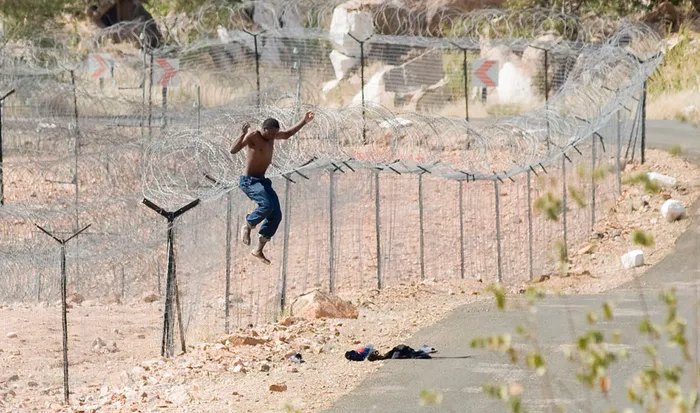Operation Dudula's campaign against immigrants raises healthcare access concerns

In a controversial move that has sparked outrage and concern, the Operation Dudula Movement, led by Zandile Dabula, is intensifying its campaign against undocumented foreign nationals across South Africa.
Image: Henk Kruger / Independent Newspapers
With scores of undocumented foreign nationals currently being turned away at Addington Hospital in Durban and other health facilities in parts of the country this week, the leader of the Operation Dudula Movement, Zandile Dabula, has vowed to continue the movement's anti-foreigner healthcare campaign across the country.
Eric Jean Butoki, who represents the Southern Africa Refugee Organisations Forum (SAROF), slammed the countrywide campaign, saying it is putting the lives of refugees, asylum seekers, and foreign nationals at risk.
This comes as more than 50 patients, believed to be undocumented foreign nationals, have allegedly been turned away at Durban's biggest hospital since the start of the campaign outside Addington Hospital on Tuesday.
"We are concerned about this operation, which has prevented foreign nationals, including asylum seekers and genuine refugees, from accessing medical help. Some of these people are on chronic medication and have made appointments to be treated on the scheduled dates. For us, we are disappointed by this Operation Dudula-sponsored campaign.
As a result, Butoki has called on the government to establish permanent refugee camps to help resolve the matter.
In various videos circulated on social media over the past week, scores of immigrants seeking medical attention have been turned away, resulting in the South African Human Rights Commission issuing a statement stating that the South African Constitution allows foreigners, including asylum seekers and refugees, the same rights to healthcare as South African citizens.
"The South African Human Rights Commission (SAHRC) reminds the public and all relevant stakeholders that the right to access to healthcare services in South Africa is a universal right afforded to anyone within the Republic of South Africa," the commission said.
Citing Section 27 (1) of the SA Constitution 1996, the commission indicated that South Africa has a provision to give healthcare access to South African citizens, refugees and asylum seekers, documented and undocumented foreign nationals, including stateless persons.
"The Constitution does not qualify or limit this right based on immigration status or citizenship. Furthermore, under Section 27(3), no one may be refused emergency medical treatment. This provision ensures that emergency healthcare must be provided unconditionally by both the public and the private healthcare facilities," it said.
Responding to this statement, Dabula said: "We will not be bullied by the likes of the SAHRC, because firstly, they are advocating for people who are in this country illegally. When you come to this country, you must be properly documented, and if you are documented, then you need to have certain permits. For those who are here to work, they must have a work permit, and those permits must come together with medical insurance, but they do not do that. Even Section 17 of the Constitution says that."
As a result, Dabula said South Africa cannot be expected to shoulder immigrants who do not have respect for the country's laws, which is why the ongoing campaign will be intensified.
"We have always said life comes first, and we will not turn away someone we can see that they require emergency medical care and might lose their lives in the process. However, what needs to happen is that they need to be arrested for being here in this country, illegally, then they can access treatment," she added.
ActionSA has also weighed in on the ongoing campaign, saying the SAHRC statement is promoting the abuse of South Africa's resources through the misapplication of Section 27 of the Constitution, which is why the party has recently called for the amendment of the Constitution.
Reacting to the stand-off between Operation Dudula and the SAHRC, Dr Shadi Ganoe from the Wits School of Law, indicated that while students and other migrants are required to provide their medical care insurance, the Constitution insists that no one should be refused healthcare based on their citizenship.
"For example, in terms of the Immigration Amendment Act 19 of 2004, any prospective international student must have medical cover with a medical scheme registered under the Medical Schemes Act 131 of 1998. This ensures that foreign students do not rely on public health services and can access private care.
"This requirement is part of the visa process and is strictly enforced. This makes foreign students and other documented long-term visa holders easy to track and regulate health care costs. They are expected to carry the burden of their own medical needs, unlike undocumented persons or asylum seekers, who may have no formal coverage at all. Still, South Africa’s Constitution remains firm: Section 27(3) says, 'No one may be refused emergency medical treatment.' This applies to everyone, citizen or not, documented or not," she said.
Meanwhile, AfriForum, the Afrikaner civil rights organisation, has submitted court documents to be admitted as a Friend of the Court (amicus curiae) in a Constitutional Court case that will determine whether the findings and recommendations made by the SAHRC are legally binding.
In their submissions to the court, AfriForum argues that the Constitution and legislation make it clear that the SAHRC does not have the power to make legally binding decisions, in line with international trends.
AfriForum’s involvement as a Friend of the Court in this case is to present the constitutionality, relevant considerations, and international customs before the court and assist the court in making a fair and constitutional finding.